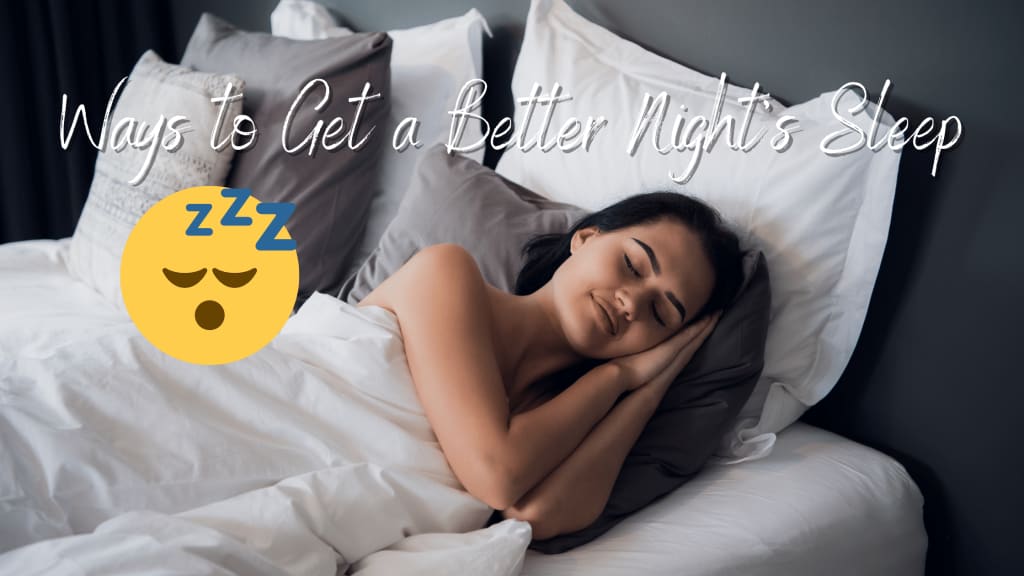Ways to Get a Better Night's Sleep
Sleep is essential for our overall health and well-being, yet many of us don’t get enough. According to the Centers for Disease Control and Prevention (CDC), one in three adults don’t get the recommended seven or more hours of sleep per night.

Lack of sleep can lead to chronic health problems such as obesity, heart disease, and diabetes, as well as impair our ability to concentrate, remember, and make decisions. There are a number of things we can do to improve our sleep, including following a regular sleep schedule, keeping a cool, comfortable environment in our bedroom, and limiting exposure to light in the evening. Here are some tips to help you get a good night’s sleep: 1. Follow a regular sleep schedule
2. Keep a cool, comfortable environment in your bedroom
3. Limit exposure to light in the evening
4. Reserve the bed for sleep and sex
5. Establish a relaxing bedtime routine
6. Limit caffeine and alcohol intake
7. Avoid nicotine
8. Avoid working or using electronic devices in bed
9. Get regular exercise
10. Manage stress
11. Avoid large meals or spicy foods before bed
12. Steer clear of stimulants such as caffeine
13. Try not to go to bed angry or stressed
14. Avoid watching television or working on the computer close to bedtime
15. Create a restful environment in your bedroom
It's no secret that a good night's sleep is important for overall health and well-being. But for many people, getting a restful night's sleep can be a challenge. There are a number of things you can do to promote better sleep, including limiting your intake of caffeine and alcohol. Caffeine is a stimulant that can keep you awake and disrupt your sleep. If you're trying to sleep, it's best to avoid caffeine in the late afternoon and evening. Alcohol may help you fall asleep initially, but it can lead to lighter, less restful sleep later in the night. If you're having trouble sleeping, it's best to avoid alcohol altogether.
There are a few things you can do to establish a relaxing bedtime routine and get a better night sleep. First, try to wind down for 30 minutes before going to bed. This means no screens (phone, TV, laptop, etc.), no bright lights, and no stimulating activities. Instead, do something calming, such as reading or taking a bath. Second, create a cool, comfortable environment in your bedroom. This means keeping the temperature on the cool side, using breathable sheets, and having little to no noise or light pollution. Finally, avoid eating or drinking caffeine in the evening, as it can make it harder to fall asleep. By following these tips, you should be able to get a better night sleep.
A cool, comfortable environment is important for getting a good night's sleep. Follow these tips to create a sleep-friendly bedroom:
1. Keep the room temperature cool, around 65 degrees Fahrenheit.
2. Use comfortable bedding that is breathable and doesn't trap heat.
3. Reduce noise and light exposure in the bedroom by using blackout curtains and earplugs.
4. Establish a regular sleep schedule and stick to it as much as possible.
5. Avoid caffeine and alcohol before bed.
6. Avoid working or using electronic devices in bed.
7. Get up and move around every few hours to keep your body active.
8. Practice some relaxation
There are a few things you can do to get a better night's sleep. One is to limit your exposure to light in the evening. This means avoiding bright lights, including the TV, computer, and phone screens, for at least an hour before bed. You can also try wearing an eye mask to block out light. Another way to improve sleep is to create a dark, quiet, and cool environment in your bedroom. This will help your body relax and prepare for sleep. Finally, it's important to establish a regular sleep schedule. This means going to bed and waking up at the same time each day, even on weekends. By following these tips, you can get the restful sleep you need to feel your best.
There are a few simple things you can do to get a better night's sleep. First, reserve the bed for sleep and sex. This means no working, watching TV, or using your laptop in bed. Establish a regular sleep schedule and stick to it as much as possible. Go to bed and wake up at the same time each day, even on weekends. Secondly, create a dark, cool, and comfortable environment in your bedroom. Make sure the temperature is comfortable for you and that the room is dark enough so that you can sleep. Third, create a relaxing bedtime routine. This might involve taking a warm bath, reading a book, or doing some relaxation exercises. Lastly, avoid caffeine and alcohol before bed. Both of
There are a few things you can do to get a better night sleep. Follow a regular sleep schedule by going to bed and waking up at the same time each day. This will train your body to know when it’s time to sleep. Create a relaxing bedtime routine for yourself that includes winding down for 30 minutes before sleep. During this time, you can do things like reading, taking a bath, or stretching. Make sure your bedroom is dark, quiet, and cool – a temperature between 60-67 degrees is ideal. Keep electronics out of the bedroom so you’re not tempted to stay up late scrolling through your phone. If you can’t fall asleep after 20 minutes, get out of bed and do
Nicotine is a stimulant, and as such, can have an impact on how well you sleep. If you are trying to get a better night's sleep, it is best to avoid nicotine in any form, including cigarettes, cigars, and chewing tobacco. Nicotine can make it difficult to fall asleep and can cause you to wake up more during the night. If you are having trouble sleeping, try to avoid nicotine for a few days and see if that makes a difference.
To get a better night's sleep, avoid large meals or spicy foods before bed. Eating a big meal can cause indigestion and make it difficult to fall asleep, while spicy foods can cause heartburn. If you're hungry before bed, try a small snack that won't upset your stomach.
There are a few simple things you can do to get a better night sleep. Avoid working or using electronic devices in bed. The light from the screens can disrupt your natural sleep patterns. establish a regular sleep schedule by going to bed and waking up at the same time each day. create a quiet, dark, and cool environment in your bedroom. keep a comfortable sleep environment by using breathable sheets and adjusting the temperature to what is comfortable for you.
There are a few things you can do to get better sleep at night. One is to get regular exercise. Exercise can help you fall asleep faster and sleep more soundly. Another is to avoid caffeine and alcohol before bed. Caffeine can make it harder to fall asleep and alcohol can make you wake up during the night.
There are a variety of things people can do to manage stress and get a better night's sleep. Some people may find that exercise helps to reduce stress and improve sleep quality. Others may find that relaxation techniques such as yoga or meditation can be helpful. Some people may also find it helpful to journal or to talk to a therapist about their stressors. ultimately, it is important to find what works best for each individual in order to reduce stress and improve sleep quality.
It's no secret that a good night's sleep is important for overall health, but sometimes it can be hard to get the rest you need. One way to improve your sleep is to steer clear of stimulants such as caffeine. Caffeine can make it harder to fall asleep and stay asleep, so it's best to avoid it in the evening and early morning hours. There are plenty of other ways to get your caffeine fix during the day, so there's no need to sacrifice your sleep in order to enjoy your favorite beverage.
There are a few things you can do to ensure you get a good night's sleep. First, try to avoid going to bed angry or stressed. If you can't fall asleep, get up and do something calming, like reading or taking a bath. Avoid caffeine and alcohol before bed, as they can interfere with sleep. Make sure your bedroom is dark and quiet, and that your bed is comfortable. Establish a regular sleep schedule and stick to it as much as possible. Finally, avoid working or using electronic devices in bed.
There are a few things you can do to ensure you get a good night's sleep. First, avoid watching television or working on the computer close to bedtime. This can stimulate your brain and make it harder to fall asleep. Second, establish a regular sleep schedule. Going to bed and waking up at the same time each day can help regulate your body's natural sleep rhythm. Finally, create a relaxing bedtime routine. This might include taking a warm bath or reading a book before bed. By following these tips, you can get the restful sleep you need to feel your best.
There are a few things you can do to get a better night's sleep. Consider using earplugs or an eye mask to block out noise and light. Establish a regular sleep schedule and stick to it as much as possible. Avoid caffeine and alcohol before bed, and try to avoid working or using electronic devices in bed. Instead, use your bed for sleep and sex and create an environment that promotes relaxation.
A good night's sleep is crucial for your overall health and well-being, but it can be hard to get the shut-eye you need when you're tossing and turning all night. If you're looking for ways to get a better night's sleep, one of the best things you can do is to create a restful environment in your bedroom. Here are a few tips to help you get started:
1. Make sure your bed is comfortable. This may seem like a no-brainer, but it's important to have a bed that's comfortable enough to actually encourage you to sleep. If your bed is lumpy or too soft, it's time for an upgrade.
2. Eliminate noise and light.
There are a few key things you can do to make sure you get a good night's sleep. First, use comfortable sheets. This will help you to relax and feel comfortable in bed. Second, limit noise exposure. Make sure your bedroom is as quiet as possible so that you can relax and sleep soundly. Finally, avoid caffeine and alcohol before bed. Both of these substances can interfere with sleep and make it difficult to get a good night's rest.
If you're looking for ways to get a better night's sleep, experts say there are a few things you can do to improve your odds. One of the most important things is to keep your bedroom dark and cool. "The ideal sleep environment is cool, dark, and quiet," says Michael Breus, PhD, a clinical psychologist and sleep specialist in Scottsdale, Ariz. "Your bedroom should be a sanctuary where you can go to relax and escape the stresses of the day." To keep your room dark, Breus recommends investing in blackout curtains or shades. And to keep it cool, he suggests setting the thermostat to between 60 and 67 degrees.
If you want to get a good night’s sleep, there are a few things you can do to make it happen. First, follow a regular sleep schedule as much as possible. This means going to bed and waking up at the same time each day, even on weekends. Second, keep a cool, comfortable environment in your bedroom. This means keeping the temperature down and making sure the room is dark and quiet. Third, limit exposure to light in the evening. This means avoiding bright screens, like those on phones and computers, in the few hours before bed. Fourth, reserve the bed for sleep and sex. This means using it only for those activities and not for working or watching TV. Fifth, establish a relaxing bedtime routine. This means spending the last hour before bed doing quiet activities, like reading or taking a bath. Sixth, limit caffeine and alcohol intake. This means avoiding those substances, especially in the evening. Seventh, avoid nicotine. This means not smoking cigarettes or using other tobacco products. Eighth, avoid working or using electronic devices in bed. This means keeping the bedroom a “no work” zone. Ninth, get regular exercise. This means being active for at least 30 minutes per day. And tenth, manage stress. This means finding healthy ways to deal with the stressors in your life.
About the Creator
Wilson.C
Strive to always inspire people and deliver positive vibes to surrounding!
“Believe in yourself. You are braver than you think, more talented than you know, and capable of more than you imagine.”
― Roy T. Bennett, The Light in the Heart
Enjoyed the story? Support the Creator.
Subscribe for free to receive all their stories in your feed. You could also pledge your support or give them a one-off tip, letting them know you appreciate their work.






Comments
There are no comments for this story
Be the first to respond and start the conversation.